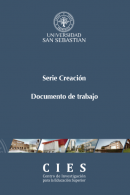
Association between genetic variants of the clock gene and obesity and sleep duration
| PROCEDENCIA(S): | Ciencia y Medicina, Ciencias de la Salud, Ciencias para el Cuidado de la Salud, USS Concepción. |
|---|---|
| CATEGORÍA(S): | Anatomía y Morfología, Bioquímica, Endocrinología y Metabolismo, Genética Humana, Genética y Herencia, Neurología Clínica, Nutrición y Dietética. |
| AUTOR(ES): | Macarena Valladares / Ana María Obregón &/Jean-Philippe Chaput. |
| TIPO DE MATERIAL: | Artículos, Investigación. |
| ARCHIVO: |
 Reconocimiento CC BY. Esta obra está bajo una Licencia Creative Commons Reconocimiento CC BY 4.0 Internacional.
Reconocimiento CC BY. Esta obra está bajo una Licencia Creative Commons Reconocimiento CC BY 4.0 Internacional.
Obesity is a multifactorial disease caused by the interaction of genetic and environmental factors related to lifestyle aspects. It has been shown that reduced sleep is associated with increased body mass index (BMI). Circadian Locomotor Output Cycles Kaput (CLOCK) gene variants have also been associated with obesity. The objective of this mini-review was to discuss the available literature related to CLOCK gene variants associated with adiposity and sleep duration in humans. In total, 16 articles complied with the terms of the search that reported CLOCK variants associated with sleep duration, energy intake, and BMI. Overall, six CLOCK single nucleotide polymorphisms (SNPs) have been associated with sleep duration, and three variants have been associated with energy intake variables. Overall, the most studied area has been the association of CLOCK gene with obesity; close to eight common variants have been associated with obesity. The most studied CLOCK SNP in different populations is rs1801260, and most of these populations correspond to European populations. Collectively, identifying at risk CLOCK genotypes is a new area of research that may help identify individuals who are more susceptible to overeating and gaining weight when exposed to short sleep durations.


